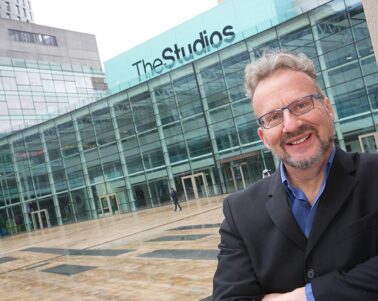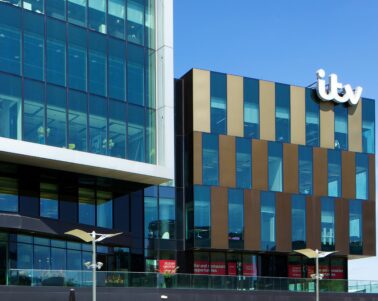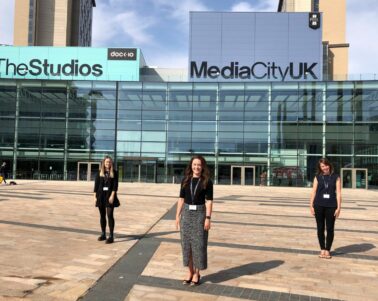
One of the UK’s leading hypnotherapists brings his practice to MediaCityUK
Costa Lambrias, hypnotherapist and self-development coach with a credible track record and media profile, has relocated his business to the Greenhouse, MediaCityUK.
Coloured umbrellas will be suspended high above the MediaCityUK open centre – celebrating and raising awareness of ADHD and neurodiversity
A burst of colour will hit MediaCityUK in time for summer, as the ADHD Foundation’s famous Umbrella Project returns for the second consecutive year (from Thursday, June 27).
Back by popular demand, the MediaCityUK open centre will once again be glowing with bright reds, blues, greens and yellows, thanks to a canopy of dazzling, coloured, suspended umbrellas, part of an initiative to raise awareness – and celebrate – Attention Deficit Hyperactivity Disorder (ADHD), autism and neurodiversity.
Devised by Liverpool-based ADHD Foundation – the largest user-led ADHD agency in Europe – the project aims to flip the disabling perception of neurodiverse individuals on its head, and instead, celebrate cognitive differences.
Thanks to the huge success of the Umbrella Project since its launch in Liverpool in 2017, the project has also recently launched in Heathrow’s Terminal 5, marking the first time the artwork has been available to view in London or at an airport. It also returned to Liverpool city centre earlier this month.
ADHD, autism, dyslexia, dyscalculia, dysgraphia and dyspraxia all sit under the “umbrella” term of neurodiversity – hence the idea for Umbrella Project was born.
Dr Tony Lloyd, chief executive of ADHD Foundation, said:
“It is a joy to work in partnership with MediaCityUK to promote neurodiversity and celebrate the intelligence, ability and employability of neurodiverse people. What a fantastic display and message to greet the employees and visitors to Salford Quays!
“When we first launched this small project back in 2017, on a little known back street in Liverpool, we were unprepared for the massive impact it was going to have. In its short lifetime, the project has grown beyond all expectation, going viral on social media, attracting international media coverage, inspiring copycat projects around the world, and launching in other locations such as MediaCityUK in 2018, and for the first time in Heathrow this year.
“The campaign aims to celebrate the many strengths and advantages that come from thinking differently and perceiving the world differently, and raise awareness in order to reduce the stigma, myths and misconceptions associated with having these conditions, demonstrating how and why neurodiverse individuals contribute to our lives, our families and our economy.
“At school neurodiverse children can see themselves as somehow ‘less than’ or lacking in intelligence and employability. We want to change that with a curriculum for the 21st century that celebrates the gifts and talents of every neurodiverse individual, empowering and enabling the next generation of children for the 21st century economy and 21st century citizenship.”
Stephen Wild, Managing Director of MediaCityUK, said:
“We’re delighted to welcome back this positive initiative which not only visually makes an impact but supports neurodiverse young people harness their talent and realise their potential. As a destination which thrives on creativity and innovation, it’s an important message to share among the young people involved as well as the wider community.”
For further information about the Umbrella Project and ADHD Foundation visit www.adhdfoundation.org.uk. You can also follow on Twitter @ADHDFoundation and Facebook @adhdfoundation #UmbrellaProject
Editors Notes
ADHD Foundation would kindly like to thank the following sponsors and supporters of Umbrella Project:
ADHD Foundation
In September 2018, ADHD Foundation celebrated double awards success after winning the Community Organisation Award for Disability at the National Diversity Awards and being nominated as Charity of the Year at the European Diversity Awards. The Foundation has been recognised for its groundbreaking work supporting children, young people and their families living with ADHD.One example of the Foundation’s campaigning work is the Umbrella Project – promoting ‘neurodiversity’ involving children with ADHD and autism celebrating their ‘super powers’, talents and employability with a public art project which saw hundreds of brightly coloured umbrellas above the streets of Liverpool and MediaCity, Salford. The Foundation also stages the largest annual multi-disciplinary conference on ADHD, attended by over 800 delegates from the UK and Europe.Now in its twelfth year, ADHD Foundation is a leading mental health charity and the largest ‘user-led’ ADHD agency in Europe, supporting more than 3,000 families every year with children and young people living with ADHD, and delivering training to over 4,000 professionals across the UK, including teachers, nurses and doctors. The work that the Foundation does can make the difference, allowing young people to self-manage the effect of their ADHD and develop resilience and coping strategies allowing them to live a full and active life.Patrons of ADHD Foundation: Comedian Rory Bremner; paralympian Jonathan Drane; Armed Forces veteran Simon Weston CBE TV presenter, Diane-Louise Jordan; Young Ambassadors – professional golfer, Joshua Grenville-Wood; and neurodiversity advocate and anti-bullying campaigner, Siena Castellon and Marcus Wilton.For further information about ADHD Foundation visit www.adhdfoundation.org.uk
MediaCityUK
You can also follow on Twitter @ADHDFoundation and Facebook @adhdfoundation W: www.mediacityuk.co.uk T: @MediaCityUK
MediaCityUK is a joint venture between Peel Land and Property (Peel L&P) and Legal and General Capital. The development is home to BBC North, ITV, the University of Salford, dock10 and innovation hub – The Landing, as well as a number of blue-chip companies including Ericsson, Kellogg’s and The Hut Group. It is also plays host to over 250 smaller creative and tech businesses.
It is the most prevalent neurodevelopmental condition in childhood, affecting between five and eight per cent of the UK population – which is approximately 500,000 school children. However, population data suggests that the number of children actually diagnosed is somewhere between one and three per cent; with less than 1% of the population who use ADHD medication – it suggests that there are many children, and indeed adults, without appropriate support to reduce the long term risks for health, wellbeing, educational attainment, employability and a range of life chances affected by ADHD.
ADHD symptoms include hyperactivity, inattention and impulsivity, resulting in frustration, anxiety, low frustration tolerance, anti-social behaviour, inability to regulate emotions, poor organisation and planning skills. Low psychological resilience is a core symptom of ADHD and predisposes children to other mental health problems such as anxiety and depression in childhood and adulthood.
Attention Deficit Hyperactivity Disorder (ADHD)
For the second consecutive year in 2018, ADHD Foundation chief executive, Dr Tony Lloyd, was included in the OUTstanding Leading LGBT+ Public Sector Executives List, presented by the Financial Times in recognition of his work to promote workplace equality and drive change in the public sector, and his endless support for the LGBT+ community. Dr Lloyd was also given the honour of National Leadership Club Award for Education and acts as an advisor to the All Party Parliamentary Group on ADHD at Westminster and other national committees.
The accolades have also been bestowed on the Foundation for its work in promoting scientific evidence, forming dynamic partnerships with the likes of Witherslack Group, Qbtech in Sweden, University of Salerno, Italy, and ADHD charities all over the world, and its role in the creation of UK and European impact reports (notably A Lifetime Lost, or A Lifetime Saved, and The Social and Economic Impact of ADHD with think-tank DEMOS), alongside tireless campaigning. The Foundation is credited with influencing policy and provision in the UK for those living with ADHD and co-existing conditions, helping to change attitudes, reducing stigma and stereotyping, and, in so doing, improving life chances for those with ADHD.

Costa Lambrias, hypnotherapist and self-development coach with a credible track record and media profile, has relocated his business to the Greenhouse, MediaCityUK.


dock10, the UK’s leading television facility, based at MediaCityUK, has again extended its agreement with ITV Studios to support their production of a range of iconic shows.

Marketing agency Sixothree is the latest SME to relocate to MediaCityUK as occupiers steadily make the gradual return to work….